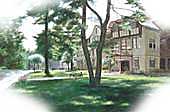Winter
1990
The Wilderness
of Beersheba
Charles Haun
Bible Teacher to Body of Christ
WANDERING
The first Biblical reference to the Wilderness of Beersheba
is found in Genesis 21:14. Abraham sent Hagar and Ishmael
away with a meager supply. They departed and wandered in the
wilderness of Beersheba. Hagar lost her way. Trying to make
it through, she spent all of her insufficient resources.
There are discoveries to be made in the wilderness. The
first key to discovery is Our Seperation. This brings us to
discover our own weakness and lack. The second key is Our
Need. In which we must adjust to our meager supply. Once we
discover that we do not have enough, we must then direct our
steps accordingly. This means that we cannot attempt to depend
upon our limited supply. Neither should we continually gaze
upon its inadequacy. Our direction must be adjusted toward
the Lord. Only then we will discover that wonderful relationship
of leaning heavily on Him.
Hagar experienced dire need and despair. This was an absolute
necessity. The foundation that made this experience possible
was the meager provisions that she had. With great provisions
we may never discover our real need. Hagar needed God more
than she needed water, the most essential element of life.
We go into the wilderness with our "bottle." It
contains whatever God's grace and wisdom dictates for that
particular time and place. Whatever we may have or move with,
all this will be very limited. We focus upon that which God
has given us, rather than upon Him. This must be adjusted.
Therefore God's unlimited supply must for the present be limited.
Discoveries and beginnings are the characteristics of the
Wilderness of Beersheba. Life is to be found here. "And
God opened Hagar's eyes, and she saw a well of water,"
Gen 21:19. In the wilderness, a well of water is life. It
meant life to Hagar.
Watch! Be alert! Be aware! Are you in a wilderness now?
Could it be the Wilderness of Beersheba? God is there. He
is sitting there beside you, as you cry. Your provision has
come, the Lord Himself.
Most Christians who come into the Wilderness of Beersheba
think that they are going to die. They are not going to die.
This wilderness is a place of beginnings, not endings. These
will not end their lives there, rather they will experience
new beginnings. At least it can be said that they are not
supposed to die there. Some may end their lives there, because
of unbelief. But it is a place of beginnings, where believers
are to find greater degrees of spiritual living, a place where
treasures are to be discovered.
Isaac also found life in the Wilderness of Beersheba. "We
have found water," reported Isaac's servants. "And
he called it Shebah; therefore, the name of the city is Beersheba
unto this day," Gen 26:32-33 (NAS). Each of us is to
find his own well of life. Abraham had been at this well before
his son Isaac. But it was not passed on to Isaac. It was necessary
for Isaac to make his own discovery.
The place of water is also a place of rest. The strife over
wells which Isaac experienced in Gerar is over. This rest
is reflected in the name "Sheba" which means "seven."
From this word comes the Hebrew word "shabat" (sabbath),the
day of rest.
Rest is a renewing. This relates to the Wilderness of Beersheba
as a place of beginnings. The New Covenant is in the picture
here. This is enfolded in the name "Sheba", also
meaning "oath" (Strong's numbers 7650 - 7652, having
to do with repeating an agreement seven times). Abimelech
came to Isaac at Beersheba to renew a covenant with him (Gen
21:22-24; 26:26-31).
Abraham discovered water at Beersheba, and that led to a
covenant. Isaac discovered water at Beersheba, and that led
to a covenant. Hagar discovered water at Beersheba, and that
led to a covenant. The covenant made to Hagar contained the
adequacy's of God, its Maker, and is represented by the well.
This replaced Hagar's spent bottle of water, which represented
her inadequacy.
The truths moving in this story are reflected in the Gospel
of John, chapter4. Jesus met the Samaritan woman at the well
and said to her, "I can give you water and you will not
get thirsty, any more." She received His words and was
brought into the New Covenant. This "well of water springing
up into everlasting life" has been provided for the "whosoever"
in John 3:16.
Ishmael and his mother found a dwelling place in the Wilderness
of Beersheba, and later in the Wilderness of Paran. "And
God was with the lad; and he grew, and dwelt in the wilderness,
and became an archer," Genesis 21:20.
Why not live in the Wilderness of Beersheba? There is a
well of water there. Do you want to leave and go elsewhere?
This is a great risk that you take, to leave the well on your
own initiative, to take your own direction. You have only
this "bottle." If you go out from this well, you
most certainly will come into a far worse predicament. Again
the water would be spent from the bottle. But here, in this
place, you have the well. You cannot take the well with you,
(Some try). But you can stay with the well. Do not insist
that the Shepherd follow you; rather follow the Shepherd.
Jacob's abode was at Beersheba. Because of deceit, he left
the place of the worship of God and went out to another place;
a place of idolatry. Many years later Jacob returned to Beersheba.
There he "offered sacrifices unto the God of his father,
Isaac," Genesis 46:1. Beersheba had been the place of
his early blessing. Now it was the place of return and renewal.
There God spoke to Jacob (Israel), just as He had to the others
at the same place.
Do not leave Beersheba. At least, do not stay away for a
long period of time; you will have to return. The process
of returning may be costly. It cost Jacob the dearest and
nearest to his heart, his wife Rachel (Gen 35:19). It further
cost him great bereavement when he was deprived of his son,
Joseph(Gen 37:35). Although the path of Jacob, in Gen 35,
headed in the direction of Beersheba, he did not then arrive.
Later, the death of his father caused him to travel yet closer
to Beersheba. But not until the news of Joseph's being alive
did Jacob finally arrive in Beersheba.
It takes some of us so long to return. Once there, it becomes
a place of renewed dedication to God, and the renewing of
God's covenant with the one who has returned.
Beersheba is a place of a return to the altar. Isaac "builded
an altar there, and called upon the name of the LORD,"
Gen 26:25. So when Jacob returns to Beersheba he returns to
the altar, he returns to the sacrifice, he returns to the
place of seeking God, Gen 46:1.
May this always be true in our lives, when we discover our
own inadequacies. Let us go back to the altar, to our surrender,
and do again our first works.


